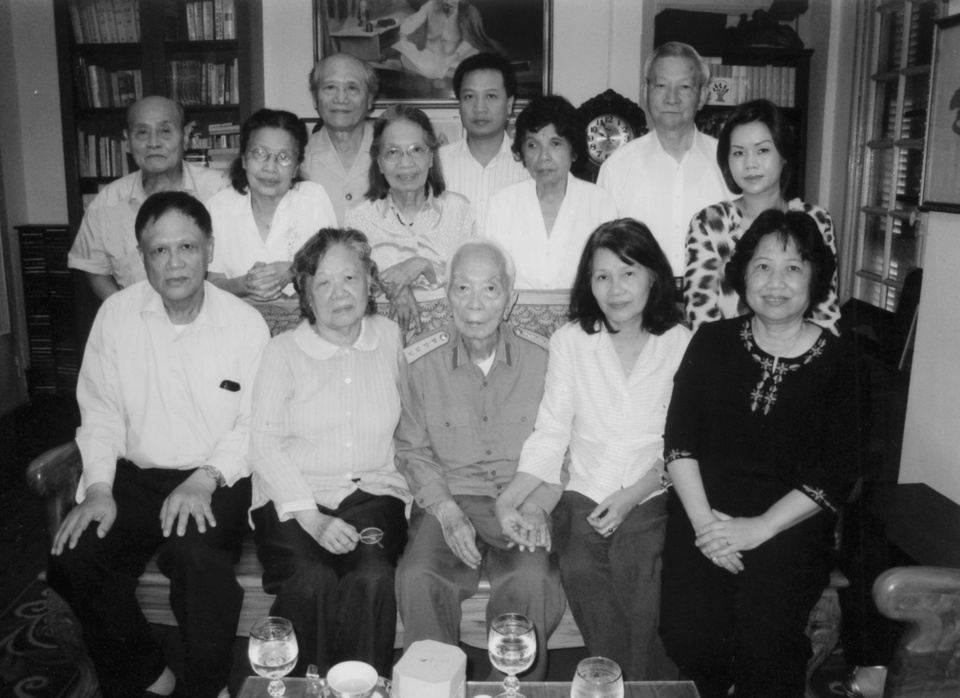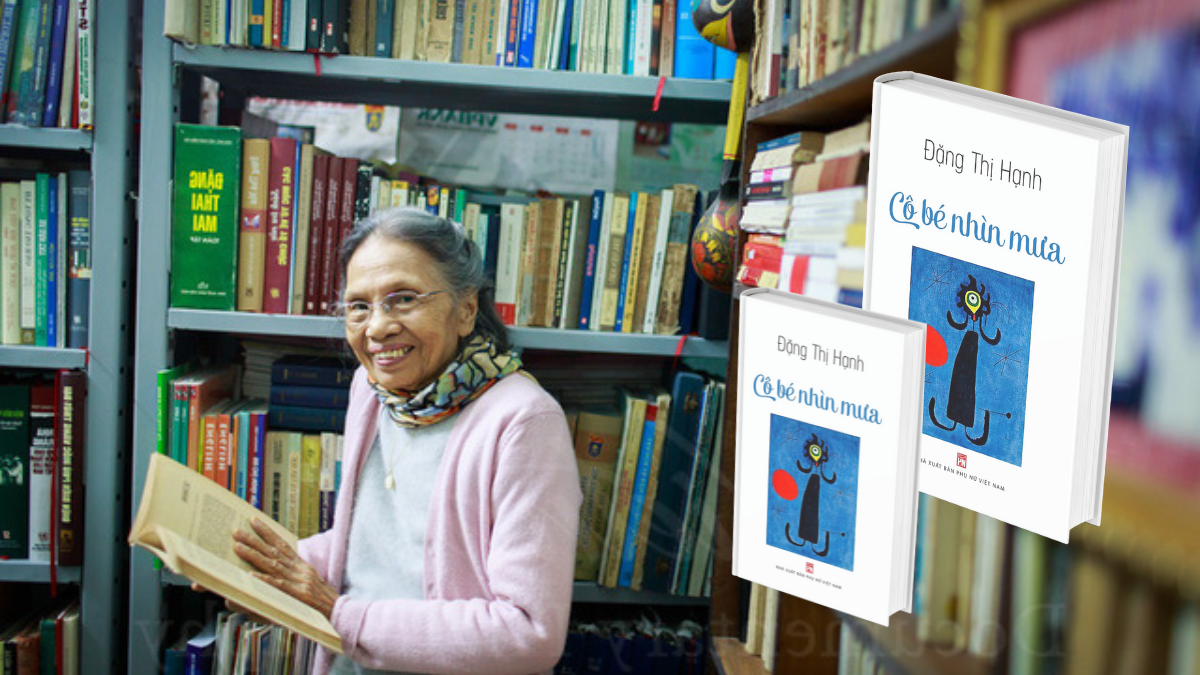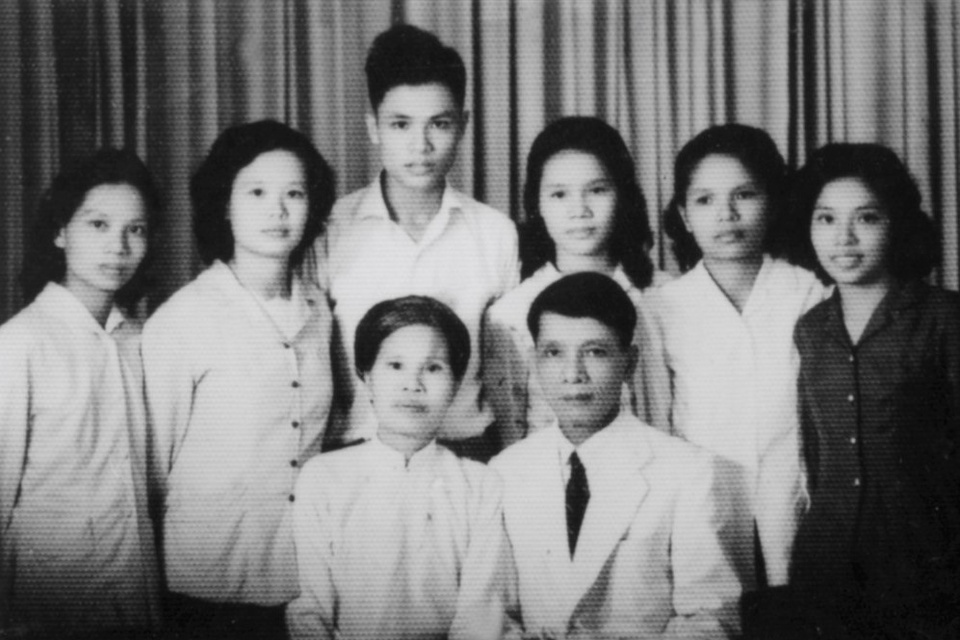Associate Professor Dang Thi Hanh with her parents, Professor Dang Thai Mai, and her sisters. From left to right: Dang Thi Hanh, Dang Bich Ha, Dang Thai Hoang, Dang Xuyen Nhu, Dang Thanh Le, Dang Anh Dao. Photo taken in Hanoi in 1962. I once heard someone say that a person's soul, character, and intellect are shaped from a very young age and perfected throughout the years that follow. Dang Thi Hanh was no exception. In her memoirs...
The little girl looked at the rain.Written around the age of 75 (published in 2008), when recalling her childhood years, she pictured herself as "a little girl, about two or three years old, sitting on a small stool" looking out at the yard watching the rain, "the raindrops falling faster and faster, chasing each other rapidly"; and a little older, still a little girl wandering around the doorway, breathing in "the pleasantly bitter, sweet scent of the medicinal herbs kept in the drawers" at her grandfather's house; later, when she reached school age, and then became a lecturer, researcher, and translator, both at the secondary and university levels, the image of that little girl watching the rain kept returning, surrounded by books, notebooks, and pens. Books and notebooks have been her closest and most trusted companions for a very long time, so long that they have shaped her character. The most beautiful images of her, even to this day, are photographs of her sitting in front of, behind, and around books, at her desk, or in the library. That habit gradually became part of her personality. Dang Thi Hanh loved "quiet activities," preferring reading to writing, indoor spaces to outdoor ones, and introspective living to excursions. I remember, back when we were in the same department at the Faculty of Literature, University of Hanoi, persuading her to go to a crowded place, even a place like a television station, was incredibly difficult. When the department held the scientific conference "100 Years Since the Death of Victor Hugo" (1985), a French writer she greatly admired, I had a hard time "dragging" her away from her reading desk at her private home in the Lieu Giai area to the television studio on Nguyen Chi Thanh Street, only a few hundred meters away. It took many attempts before she finally agreed. On such occasions, she would often have an excuse, explaining, "I look terrible on camera, I'm not photogenic, don't make me appear on air." Even at nearly 50 years old, after almost 30 years in the teaching profession, one would think teaching would no longer be a problem for her. Yet, once, around 1978, when she was assigned to teach a part-time class in Hung Yen, Ms. Dang Thi Hanh cleverly persuaded me: "Hey, there's a part-time class in Hung Yen, can you teach in my place? They'll pay you there." Knowing that I was eager to teach to improve my teaching skills (and also wanted to earn some extra income), she still anxiously tried to persuade me, fearing I wouldn't accept.
Dang Thi Hanh is someone who dislikes "movement," preferring friends and books, and enjoying her time reading.
The little girl looked at the rain.She recounted countless times how books had become her closest companions. Books were scattered around the doorways and throughout the house, and her father, Professor Dang Thi Mai, said, "My children only need to pick up those books to fill their professional knowledge." Then she spoke of her days reading at the library on Uml Street, at the Paris University of Education, France. As a leading expert on Hugo (having written several books about him), during the period of preparing material for her monograph, *Victor Hugo's Novels*, books about this romantic writer piled up on her bookshelves, on her desk, even on her chair and dining table, to the point that her father, Professor Dang Thai Mai, once exclaimed during a visit: "My daughter, is Victor Hugo the only author in French literature now?" Knowing her father was subtly reminding her to "broaden her scope," and not focus solely on a few authors, the French literary scholar understood somewhat. But Dang Thi Hanh was a very unchangeable person. Moreover, at that time, she was determined to complete her research project, which was consuming too much of her time, so she just ignored it.
Indeed, in Vietnam at that time, Hugo was the most famous writer, alongside the realist Onoré de Balzac. However, Vietnamese researchers and educators lacked any truly comprehensive works on either of them. Because she didn't have the opportunity to read much of Balzac, she wanted to focus on Hugo. Prior to that, around the 1970s, Dang Thi Hanh had already published a book about Hugo as a famous figure. The second book, by the same author, was the most in-depth and systematic treatise on his prose works. Only after completing the book on Hugo did Dang Thi Hanh expand her focus to other writers. In the five-volume History of French Literature, a textbook for students published by the Department of Western Literature in collaboration with the University of Paris 7, she wrote about the following authors: Alphonse de Lamarrtin, Alfred de Vigny, Alfred de Musset, Gerard de Nerval, George Sand (volume 2, 19th century), André Breton and Surrealism, Marcel Proust, and the chapter on the Synopsis of the 20th Century. She was also the editor-in-chief of the 20th-century volume.
Since then, Dang Thi Hanh's research direction has expanded day by day. In a book titled...
Some prominent figures in 20th-century French prose(Da Nang Publishing House, 1978), new names in 20th-century French literature reappeared in her research catalog:
"Proust viewed from the end of the century",
"Margueritte Duras's lover, a retelling of an old story."(writing about the novel "The Lover of North China")
"Childhood memories in some of the award-winning works of 1995"(about the writer Andrei Markin),
Western detective literature, near-literary literature, and "authentic" literature.”, “
Write in a language other than your mother tongue."(Regarding some African Francophe writers)"
Autobiographies and French novels of the 20th century(regarding Duras and Sartre),
The luck of the novel(quoted from section “
General overview of the 20th century“(in the History of French Literature). Recently, she has also published papers at the Kafka Scientific Conference, translated Michel Tournier, Marcel Proust… Clearly, Dang Thi Hanh is a diligent and hardworking scientist, regardless of time and age. It should be remembered that, administratively, Associate Professor Dang Thi Hanh officially retired in 1990, although at that time, the university offered to extend her working time. But Dang Thi Hanh still requested to resign. She believed that one cannot only work while still in office. Furthermore, her closest friend and colleague for many years, People's Teacher Le Hong Sam, had also retired by then. Retirement does not mean ceasing work. Her love for France and French literature always remains abundant.
For over 33 years since then, nearly a third of a century, this "resilient" woman with a "thin, gaunt" appearance has persistently worked, tirelessly "cultivating" her "field of words," without any "self-interest." Although she works very slowly, it's all because of her love of books, a love that is careful, precise, fair, and honest. Unlike some other researchers of her time, Dang Thi Hanh is not "greedy" or "overambitious." Therefore, with her profound and extensive knowledge, Dang Thi Hanh did not leave behind many works or writings. She only wrote about what she truly loved and understood. In her scientific pronouncements, Dang Thi Hanh always knew how to moderate her knowledge. Even when guiding or refuting students' theses and dissertations, she only spoke within her area of expertise, speaking truthfully and directly, without circumlocution or avoidance…
In her personal life, Dang Thi Hanh was simple, friendly, and warm, but in her scientific pursuits, she was equally rigorous, straightforward, and strict. I remember her once recounting how she resolutely refused an invitation from the Ministry of Education and Training to review a doctoral dissertation on the English writer Hemingway, for the simple reason that "it wasn't my area of expertise." Dang Thi Hanh probably understood better than anyone that God doesn't bestow all knowledge and power upon everyone. Therefore, each person in this life needs to know how to restrain and adjust themselves. Human capabilities are limited. Only those with the extraordinary minds of Einstein, Newton, Hugo, or Balzac can spread their energy throughout their lives. The majority, however, can only accomplish a limited amount of work. With her humble nature of "knowing oneself and knowing others," Dang Thi Hanh "courageously" set aside all unnecessary desires. She had only one love: science, literature, books, and France. This passion was evident even in her concern for her children and grandchildren. During my visits to her home, I often heard her talk about her son who worked far away and whom she loved. She said, “He’s very passionate about his articles in scientific journals; he has very unusual thoughts, unlike anyone else. But he’s very dedicated, you know. Meanwhile, his monthly income is very low.” She spoke of her son with great pride, without any complaint or criticism.

A photograph of Associate Professor Dang Thi Hanh's siblings and grandchildren in Hanoi on August 25, 2007, on the occasion of the 96th birthday of General Vo Nguyen Giap (seated in the middle, front row).
Recently, during several visits to her home, I often heard her confide: "My dream is to see one last time before I die."
The little girl looked at the rain."Reappearing again." At first, I was very surprised. Of all her research and translation works, though not many, why did she only like one memoir? Thinking about it again, her choice made sense. So, this person "toiling in the field of words" only dreamed of seeing her own story retold once more, told by herself. I understand her sincere wish. Because,
The little girl looked at the rain.It's not just a portrait of one individual's life, but the lives of many: family, friends, colleagues, and the country. Before
The little girl looked at the rain., Dang Thi Hanh once wrote
Grandmother and grandchildNot every grandmother in this world writes about her grandchildren with such deep affection. In this special memoir, although it is a true autobiography, there is very little personal favoritism or bias towards individuals, relatives, or even the "heroes" around her. In the book, Dang Thi Hanh refers to them as "my soldiers" in a simple and discreet way, very different from the typical conventions of the autobiographical genre. Writer Nguyen Ngoc calls it "a kind of quiet history." As a woman, a wife, and a mother in the family, Dang Thi Hanh's most important mission is simply to create balance in life, so that her loved ones can develop and be as useful as possible...

In 2013, France did not forget to award Associate Professor Dang Thi Hanh the Order of the Academic Palm, an honor reserved only for those who have made significant contributions to the dissemination of French culture to a wider readership. Associate Professor Dang Thi Hanh deserved this. From birth until her passing, she remained true to herself: unpretentious, yet utterly devoted to books and French literature. It is impossible to fully describe her in these few words. But I believe that, in the distant horizon, she can still read this and smile. Because throughout her life, she loved books.


